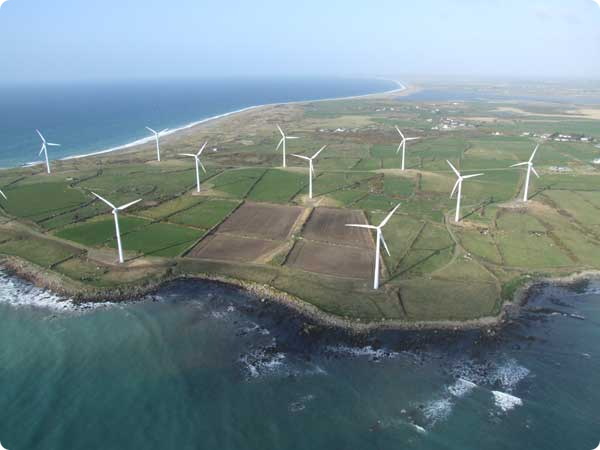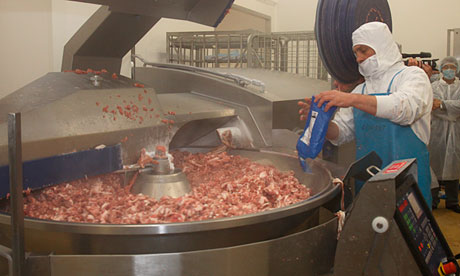Minister Pat Rabbitte rules out nuclear plants for Ireland


Minister for Communications, Energy and Natural Resources Pat Rabbitte has said nuclear energy will not be generated in Ireland but the State had no objection to importing such energy.
Minister for Communications, Energy and Natural Resources Pat Rabbitte has said nuclear energy will not be generated in Ireland but the State had no objection to importing such energy.
Mr Rabbitte spoke to parliamentarians from England, Scotland, Wales, Northern Ireland and the Republic this morning in Donegal, where the British-Irish Parliamentary Assembly is discussing the topic of energy across borders.
“Under our planning laws at the moment the issue is not one for Ireland, which is not to say that in good old-fashioned Irish tradition that we would have any objection to importing nuclear fused energy.
“We have a habit of accommodating ourselves to legislation that facilitates the use of the neighbouring island for matters that we don’t want to deal with here,” he said to laughter at the conference.
Mr Rabbitte also the Irish Government wants to see Britain “remain central” to the European Union. He said the developing economic relationship between Ireland and Britain would be challenged if Britain’s trading relationship with the EU changed.
He told the British-Irish Parliamentary Assembly that continuing membership of the EU was a matter for British politicians and British voters.
“But the issue also concerns our shared future. The Irish Government has made no secret of its view that the EU is stronger with Britain as part of it. We want to see the UK remain – and remain central – to the European Union.”
Mr Rabbitte said Ireland had to exploit its indigenous renewable energy sources. Expert advice suggested Ireland had the capability to achieve its national targets for renewable electricity from onshore renewable generation alone, with capacity to spare.
“This means that there is potential for projects of scale onshore that are aimed at export markets. It also means that our offshore wind resource can be developed as an export opportunity.”
He said the commercial exploitation of wind resources must be accompanies by a very real commercial return to the people.
Mr Rabbitte said Ireland was hugely wasteful of energy and there was not adequate debate about the topic. He said the media generally found energy too difficult a subject to delve into, but huge developments were taking place.
Women smaller brains but more efficient than men
Women may have smaller brains than men, but they are more efficient, according to a new study.
Scientists have been long puzzled over why women can show just as much intelligence as men, although their brains are eight per cent smaller.
Now a study by universities in Los Angeles and Madrid have shown that for women, brain size does not matter because they are more efficient.
The research, reported in the Sunday Times, has implications for assumptions made about a person’s intelligence.
The study, published in the journal Intelligence, carried out a series of intelligence tests on men and women.
Despite the fact the women had smaller brains they performed better in inductive reasoning, some numerical skills and were better at keeping track of a changing situation – although men did better on spatial intelligence.
The researchers concluded that women’s brains are able to complete and even excel at complicated tasks with less energy and fewer neurons.
“At this structural level, females might show greater efficiency requiring less neural material for achieving behavioural results on a par with males,” the paper read.
In contrast a larger hippocampus, where most of the reasoning is carried out, in men, can mean better performance in intelligence tests.
Trevor Robbins, professor of Cognitive Neuroscience at Cambridge University, said the results show size does not matter – for women.
“The smaller size could represent more intense packing of nerve cells or more active signalling between them,” he told the Sunday Times. “Meaning they are operating more efficiently.”
“The research suggests that, in women, the smaller the hippocampus, the better it works. The size of a structure doesn’t necessarily bear any relation to how well it performs.”
Two new areas of Irish medicine management programme’s announced

TWO AREAS THE MEDICINE MANAGEMENT PROGRAMME WILL TARGET ARE CHOLESTEROL-LOWERING MEDICATIONS AND ANTI-ULCER DRUGS
Patients will notice a difference within the next month.
Speaking on RTÉ’s Morning Ireland, Dr Barry said: “I feel we will certainly get the buy-in or cooperation from our colleagues up and down the country and for patients it could make a real difference.”
He said: “If you are prescribed a lower-cost medication it could save you up to €300 or €400 per drug per year.”
Dr Barry said the two areas they will be prioritising are cholesterol-lowering medications and anti-ulcer drugs.
The Government had been encouraged to introduce a new system for prescribing generic drugs as part of the EU-IMF bailout.
He said: “It isn’t right and it’s very difficult to defend this situation. We haven’t had an effective generic drugs market in this country for many years.
“We all know the price of generic drugs should be between 50% and 90% below the current proprietary drug price. So, it’s impossible to defend this.”
However, he said a new reference pricing structure, which is part of the Health Bill 2012, will see a reduction in costs.
Irish Tax revenues down by 1.3% for 2013


February tax revenues amounted to €2.04 billion, a decrease of 8.4 per cent on the same month in 2012, according to the Department of Finance.
Tax revenues in the first two months of 2013 together were down €77 million (or 1.3 per cent) on the same period in 2012.
Despite the weak receipts, the Department said its overall budget targets were being met in the first two months of the year and were in-line with projections for 2013 set out in December’s budget.
For the month of February 2013 the exchequer deficit was €1.64 billion, compared with a deficit of €1,678 million in February 2012.
The broad stability in the deficit was the result of exchequer spending falling in the first two months of the year when compared to the same period in 2012.
Both current and capital spending was down. By department, the biggest spenders also registered lower outlays, with the largest decline – of five per cent – recorded by the Department of Social Protection.
Exchequer borrowing increased by €25.8 billion during February 2013.
“This is almost exclusively due to €25 billion of bonds issued to the Central Bank to replace the promissory note” the department said.
“While impacting exchequer debt substantially, this has no impact on general government debt” it added. The former measure is a cash-basis method of accounting, while the latter is accruals based and the one watched by financial markets.
Exchequer debt servicing costs, at €883 million to end-February 2013 were fractionally lower than the corresponding period last year. This marginal year-on-year decline “primarily reflects timing factors” the department said.
Irish frozen burger sales plummet after scandal


FROZEN BURGER SALES ARE DOWN 42 PER CENT ACROSS ALL THE STATE’S LEADING SUPERMARKETS.
Sales of frozen burgers in Irish supermarkets have collapsed in recent weeks as shoppers have turned their backs on the products in the wake of the horse meat scandal which continues to tarnish the reputation of food producers and retailers across Europe.
Frozen burger sales are down 42 per cent across all the State’s leading supermarkets, new figures from market research company Kantar Worldpanel have revealed. The decline mirrors sales data in the UK where frozen burger sales fell 43 per cent over the same period.
While significant numbers of consumers have lost faith in certain products they have not shifted their buying habits away from the large supermarkets, the research indicates.
“The impact of the horsemeat issue has so far only affected what consumers put in their baskets rather than where they do their shopping,” said Kantar’s David Berry.
While Aldi was one of the first chains implicated in the current scandal, the latest supermarket share figures do have some good news for it.
In the 12 weeks up to the middle of last month, the German discounter recorded sales growth of 29 per cent and its market share has gone up from 4.6 per cent last year to 5.9 per cent now. It is now the fifth most popular supermarket in the State having moved ahead of its main rival Lidl for the first time late last year.
“What is notable from Aldi’s performance is that it has grown sales of fruit and vegetables – the most valuable grocery category – by 39 per cent this year,” Mr Berry said.
Among the main supermarkets Dunnes was the only one to increase its share of the market. It beat the market with 4.1 per cent sales growth in the last quarter. The news for Tesco was not so good. While it remains the most popular supermarket in the Republic with a market share of 28.1 per cent, it has lost 0.5 per cent of that share in the last 12 weeks.
According to Kantar, grocery inflation was at 5.8 per cent for the 12-week period up to February 17th, the highest level seen since the 6.2 per cent price inflation recorded by Kantar in September 2008.
Its inflation figure is based on over 30,000 products compared year-on-year in the proportions purchased by Irish shoppers.
It is a “pure” inflation measure in that shopping behaviour is held constant between the two comparison periods – shoppers are likely to achieve a lower personal inflation rate if they trade down or seek out more offers.
As the Arctic ice melts, it is now full steam ahead for shipping?
A study suggests that global warming is opening up a first-time chance to cruise through the Northwest Passage, which could translate into big savings in time and money for shippers.
Who said global warming is all bad?
Shipping routes across the Arctic Ocean — which have been ice-covered and impassable since humans invented ships millenniums ago — could be open to ships for the first time by midcentury, thanks to climate change, a new study suggests.
This includes shipping directly across the North Pole and through the famed Northwest Passage, a sea route from Newfoundland toward the Bering Strait,neither of which has ever been done. The study appears in Monday’s edition of the Proceedings of the National Academy of Sciences Plus.
“Nobody’s ever talked about shipping over the top of the North Pole,” according to study lead author Laurence C. Smith, a geography professor at UCLA. “This is an entirely unexpected possibility.”
The earliest that sea routes would be taken directly over the North Pole and through the famed Northwest Passage would likely be in the 2040s or 2050s, Smith says. This sort of shipping would also occur only in late summer and early autumn, he adds: The prime month would be September, when Arctic sea ice is at its annual minimum.
“The development is both exciting from an economic development point of view and worrisome in terms of safety, both for the Arctic environment and for the ships themselves,” Smith says.
Going directly across the Arctic, or through the Northwest Passage, could lead to significant savings in time and money for shippers. For instance, Smith estimates that traveling from Rotterdam to the Bering Strait via the Northern Sea Route would take almost 19 days, while traveling across the North Pole could be done in 14.6 days.
Ships the use the North Pole route, though, will still need to be special ice-breaking ships, due to random floating ice that still remains on that route. But regular ships — which make up about 99% of the world’s fleet, Smith says, might be able to use the Northwest Passage.
In the past couple of summers, a few dozen ice-breaking ships have traversed the Arctic through the Northern Sea Route, which is controlled by Russia, who “charge a lot of money” to use it.
Smith and his team used computer model simulations of future climate warming in their study.
No part of the world has seen as much dramatic warming in recent decades as has the Arctic. Since the 1980s, average temperatures in the Arctic have risen faster than the global average. Also, sea ice extent in September 2012 reached the lowest ever observed in the satellite record (1979-present), according to the National Oceanic and Atmospheric Administration’s annual Arctic Report Card.
Most of the Arctic Ocean currently is controlled by five countries — the USA, Canada, Russian, Denmark and Norway — all of whom have a coastline on the ocean. The center of it, however, which includes the North Pole, is considered to be in international waters.
The new shipping routes in the Arctic won’t replace the routes through the Panama or Suez Canals, which remain the primary routes for worldwide shipping.
Given this potential for new shipping routes in the Arctic, NOAA recently issued a plan for updated Arctic maps as part of a major effort to improve navigation for Arctic areas experiencing increasing vessel traffic as ice disappears.
“Ships need updated charts with precise and accurate measurements,” said Capt. Doug Baird, chief of NOAA’s Coast Survey’s marine chart division. “We don’t have decades to get it done. Ice diminishment is here now.”


No comments:
Post a Comment